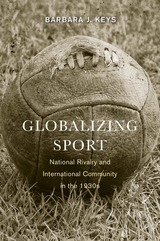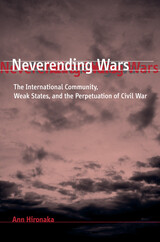
In this impressive book, Barbara Keys offers the first major study of the political and cultural ramifications of international sports competitions in the decades before World War II. She examines the transformation of events like the Olympic Games and the World Cup from relatively small-scale events to the expensive, celebrity-packed, politically resonant, globally popular entertainment extravaganzas familiar to us today. Focusing on the United States, Nazi Germany, and the Soviet Union, she details how countries of widely varying ideologies were drawn to participate in the emerging global culture. She tells of Hollywood and Coca-Cola jazzing up the 1932 Olympic Games in Los Angeles, of Hitler crowing over the 1936 Berlin games, and of the battle between democracy and dictatorship in the famed boxing matches between Joe Louis and Max Schmeling. Keys also presents one of the best accounts to date of the Soviet relationship to Western sports before the rise of the “big red sports machine.”
While international sport could be manipulated for nationalist purposes, it was also a vehicle for values—such as individualism and universalism—that subverted nationalist ideologies. The 1930s were thus a decade not just of conflict but of cultural integration, which laid a foundation for the postwar growth of international ties.

Since 1945, the average length of civil wars has increased three-fold. What can explain this startling fact? It can't be ethnic hatreds and injustices—these have been around for centuries. In Neverending Wars, Ann Hironaka points to the crucial role of the international community in propping up many new and weak states that resulted from the decolonization movement after World War II. These impoverished states are prone to conflicts and lack the necessary resources to resolve them decisively. International aid and external military intervention from the international community often perpetuate such conflicts. And the Cold War further exacerbated the problem by providing large amounts of military aid. The continual infusion of weapons and resources can prolong such wars indefinitely.
This timely book will provide an entirely new way to look at recent, vicious civil wars, failed states, and the terrorist movements that emerge in their wake.

Exemplary of this new approach were Western responses to ethnic cleansing in the former Yugoslavia and genocide in Rwanda. In order to avoid costly interventions, U.S. and European leaders traced these crimes to ancient tribal enmities and professed that the role of the international community should be limited to a humanitarian, impartial, and conciliatory engagement with all the warring parties. They thus managed to appear righteous but powerless, at least until NATO’s intervention in Kosovo. Faced with this doctrine, both the liberal and radical wings of the Western Left found themselves in an uneasy position. Liberals, while lured by their leaders’ humanitarianism were nonetheless disturbed by the dismal results of the policies carried out in the name of the international community. Conversely, anti-imperialist militants were quick to mock the hypocrisy of their governments’ helpless indignation, yet certainly not prepared to demand that Western powers resort to force.
Are we still in this “age of the international community”? Feher shows that with NATO’s intervention in Kosovo, both liberal and radical activists suddenly found their mark: the former welcomed the newfound resolve of their governments, while the latter condemned it as the return of the imperialist “new world order.” For Western leaders, however, the war against Serbia proved an accident rather than a turning point. Indeed, less than a year later, their indifference to the destruction of Chechnya by Russian troops suggested that the discursive strategy exposed in Powerless by Design might remain with us for quite some time.
READERS
Browse our collection.
PUBLISHERS
See BiblioVault's publisher services.
STUDENT SERVICES
Files for college accessibility offices.
UChicago Accessibility Resources
home | accessibility | search | about | contact us
BiblioVault ® 2001 - 2024
The University of Chicago Press









